CIRCLE Growing Voters
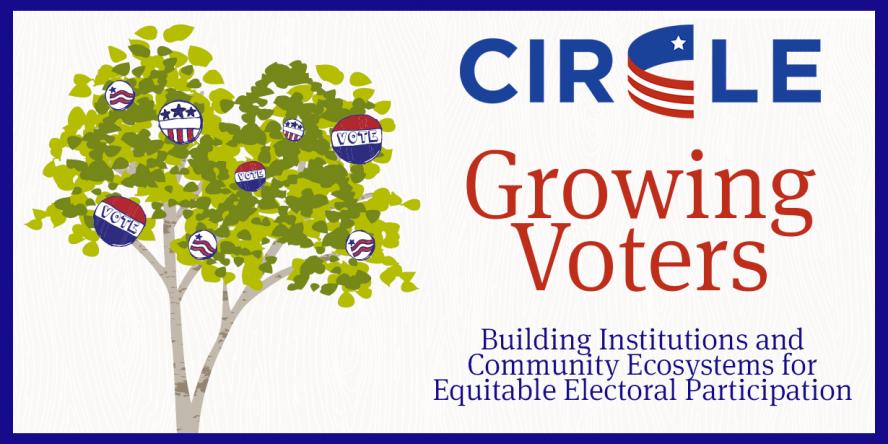
CIRCLE Growing Voters is a paradigm-shifting framework for developing the next generation of voters. Based on rigorous, comprehensive research, including findings from an exclusive survey of teens, it serves as a guide for every institution and community to play a role in this work. The report includes actionable recommendations for educators, organizers, policymakers, journalists, funders, families, young leaders, and more.
Read the executive summary and explore the full report below.
24 Ways to Grow Voters In 2024
Efforts to prepare young people for democratic participation must occur all year, every year. As campaigns, community leaders, activists, educators, journalists, election officials, and young people do their work in this election cycle, we share key, cross-cutting recommendations for how to grow voters in 2024.
I Want to Grow Voters By...
Improving Civic Education
Civic learning in K-12 schools is a critical foundation for youth participation in democracy. Explore our research detailing how institutions can provide more equitable civic education.
Building Political Homes
Young people need spaces where they can learn and talk about political issues, and take action with their peers and adults. Learn more about how to build these political homes.
Improving Access to Elections
Facilitative election laws and policies can make it easier for young people to register and vote, while programs like youth poll worker initiatives can foster deeper engagement with the election system.
Understanding Youth Now
Young people are not a monolith. Different youth care about different issues, face different barriers to voting, and require diverse strategies to engage effectively and address inequality.
Helping Information Reach Youth
Young people need access to information about politics, issues, and elections. The media, local organizations, and other stakeholders can make sure they get it.
Exploring My Community
The communities where youth do or don't vote are also different, and those varied local conditions can also help or hinder young people's participation. Learn more about where you live.
Learn More and Take Action
We're excited to connect with you and to support your efforts to grow voters in your community. Fill out our Community Mapping Tool to start exploring how to turn our framework into action. And sign up for our email list to see more research, resources, and recommendations that can support your work.
I Am A...
Schools are a critical setting for learning about elections and voting. School-based opportunities are especially important for youth who lack such opportunities in other areas, like through their personal networks or experiences with media. And as institutions that reach the vast majority of teens, K-12 schools have a critical role to play in reducing disparities and inequities in civic learning and engagement.
Our recommendations for K-12 schools and educators include: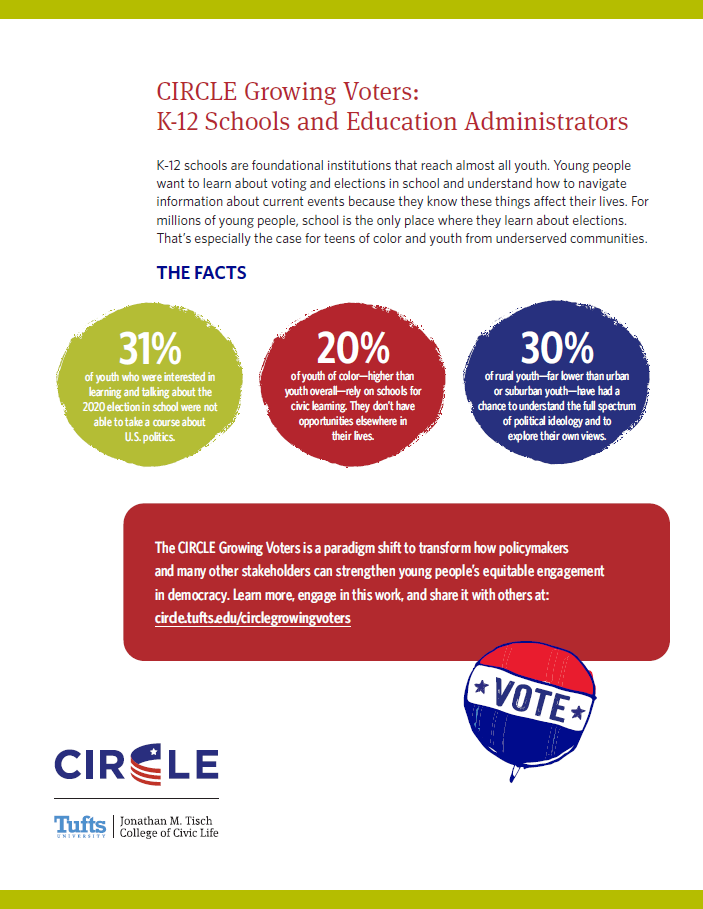
- Don’t silo civic learning: teach about elections across the curriculum
- Let students register (and pre-register) to vote in school
- Embrace media creation as a pedagogical tool
- Expose students to extracurricular opportunities
- Embrace values of equitable democracy in the classroom
- Fund and facilitate youth journalism
- Embrace youth leadership and voice
Read the CIRCLE Growing Voters
Summary for Schools and Educators
Panel of Educators Discuss How to Grow Voters
In August we hosted an event titled Engaging Students for an Informed Democracy: The Role of K-12 Schools. A panel of K-12 leaders and experts shared their thoughts on how schools and educators can provide better and more equitable civic education that prepare all young people for elections and democracy.
Partisan organizations and political campaigns are the largest stakeholders in voter engagement, often spending billions of dollars on outreach each election cycle. Their potential to engage young people is massive, but currently these organizations are structured and incentivized to reach those they consider the likeliest voters, often excluding young people who have just turned 18, youth who are not in college, and other groups that they consider less likely to turn out. These organizations must shift away from a focus on mobilizing those who have already voted before to a focus on developing young voters and broadening the electorate.
Our recommendations for political campaigns include: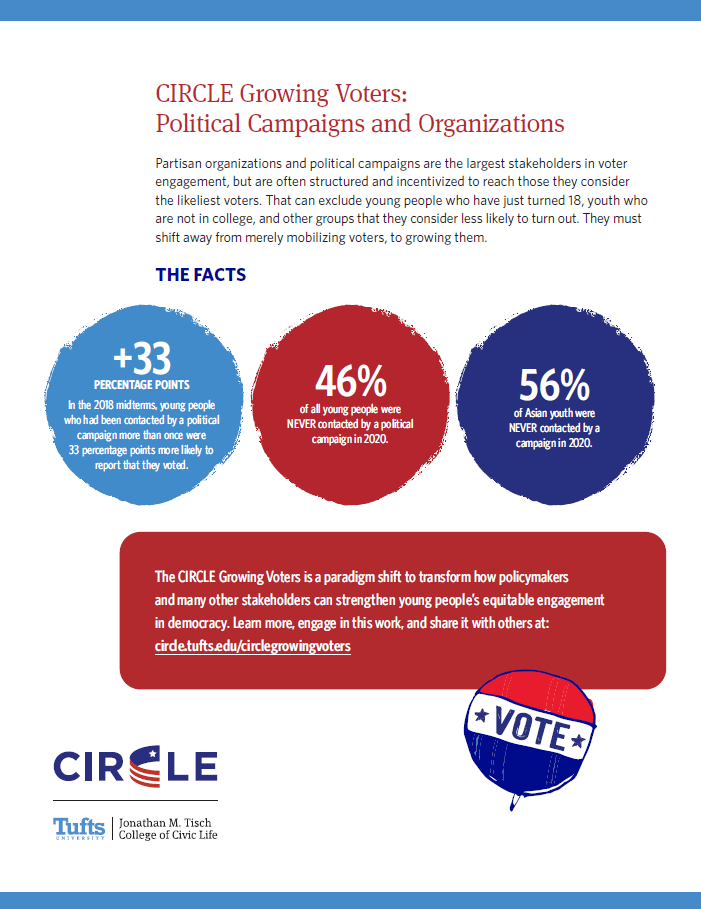
- Hire young people to develop and implement strategies to reach other youth
- Consider what youth-centered policies can and should look like
- Engage with existing local grassroots organizations year-round
- Reach beyond college campuses
- Use digital tools, but don’t forget the power of personal
Read the CIRCLE Growing Voters
Summary for Political Campaigns
Every community has groups and organizations that can work to register and engage voters. These may include youth-led groups or student clubs, issue advocacy organizations, local museums, or health centers that hold voter registration drives. Their electoral outreach is especially relevant to young people who care about local issues and who may have more limited access to other pathways to participation, but the potential of these organizations to engage young voters has not been maximized.
Our recommendations for community organizations include: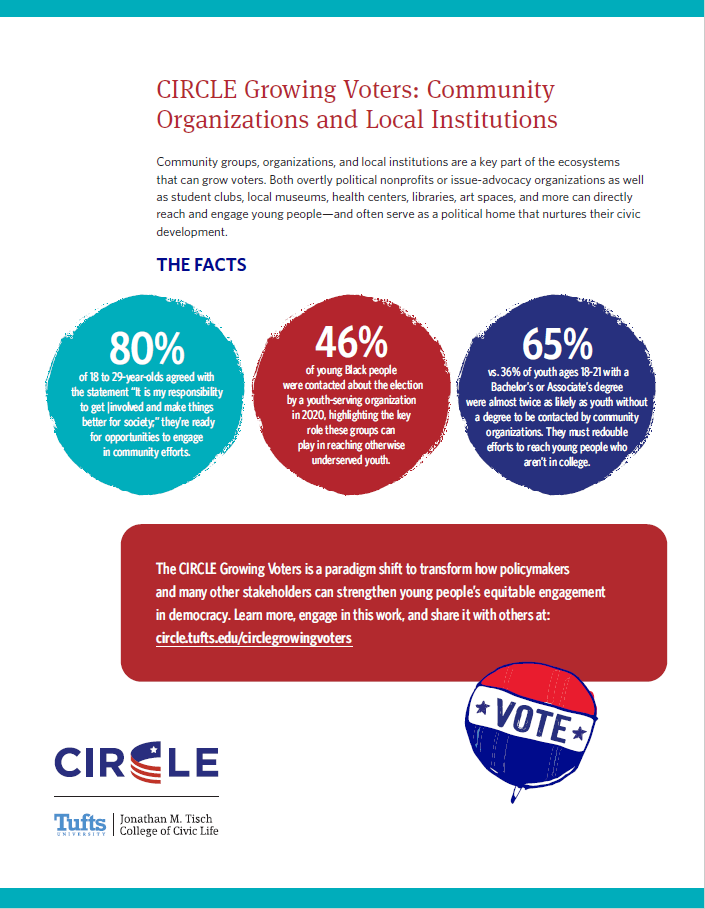
- Engage in nonpartisan political outreach and engagement
- Leverage your relationships with young people
- Diversify your outreach and start young
- Build community
Read the CIRCLE Growing Voters
Summary for Community Organizations
Election processes are set up by people who, by definition, have a lot of experience with voting and elections. Unless they intentionally make efforts to consider and include the diverse needs and perspectives of those—like new voters—who don’t have that knowledge and experience, these processes can
unintentionally rely on misconceptions about what potential voters do or don’t know and create barriers to participation. Election administrators must adopt a CIRCLE Growing Voters mindset to effectively and equitably reach newly eligible voters—especially those from communities historically underrepresented in politics and elections
Our recommendations for election officials include: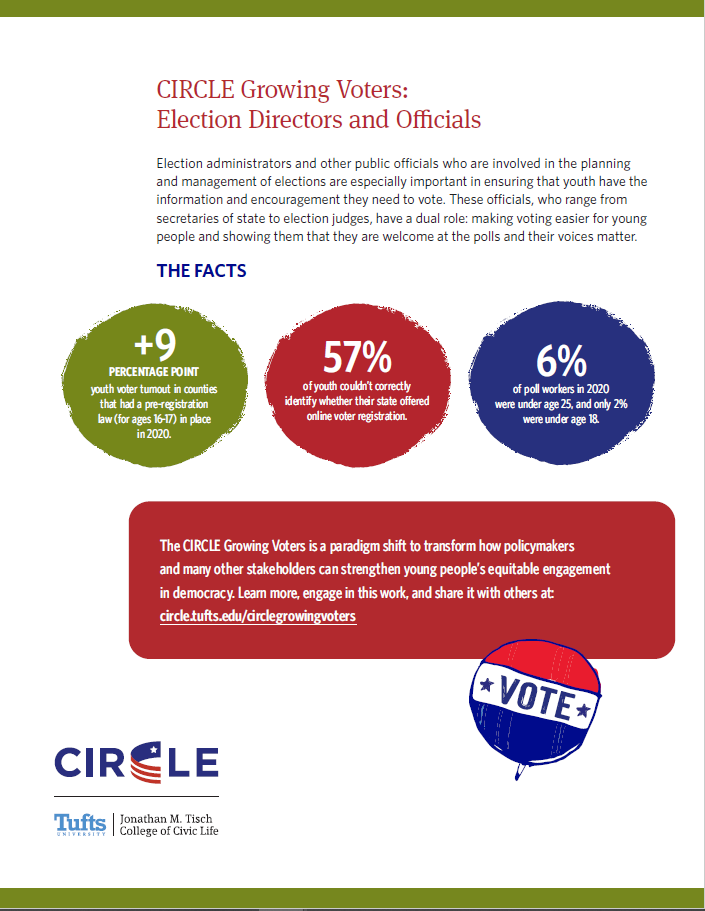
- Talk with, listen to, and partner with young people
- Directly ask youth what they need to be ready to vote
- Engage young people before they reach 18
- Make voting data accessible
- Hire young people
Read the CIRCLE Growing Voters
Summary for Election Officials
Foundations, philanthropists, philanthropic advisors, and other organizations that support civic engagement and democracy are critical to the transformations required to grow voters. The scale and depth of the changes envisioned by this new paradigm require both substantial resources and shifts in how these organizations decide what to support in order to generate lifelong electoral participation for generations to come.
Our recommendations for funders include: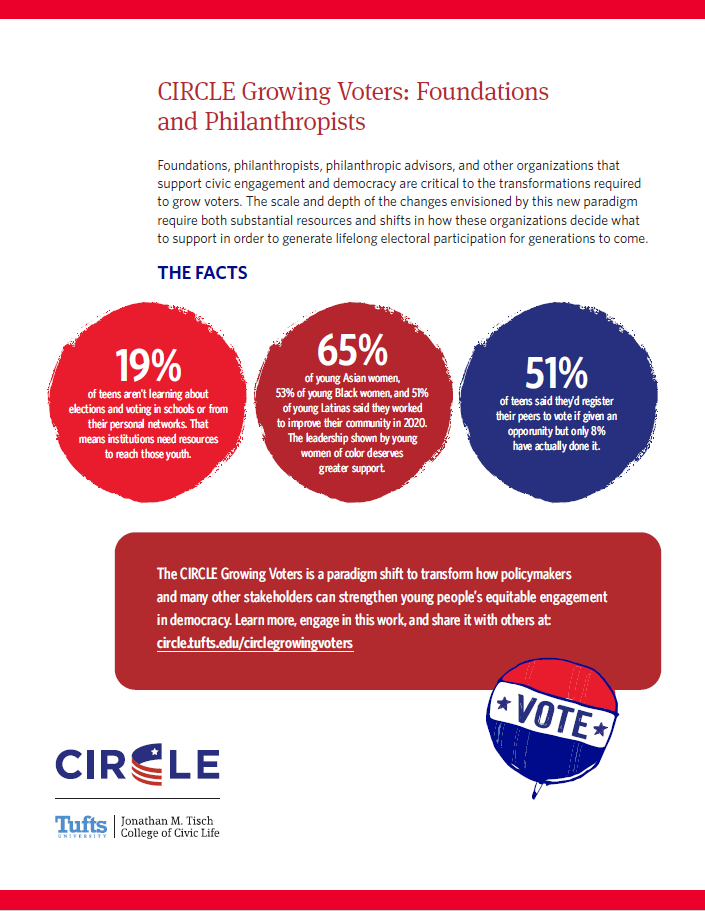
- Listen to and consult diverse young leaders
- Support efforts to/that pay young people
- Fund youth-led projects in a variety of sectors
- Ditch election cycles in favor of year-round or multi-cycle funding
- Develop a CIRCLE Growing Voters ecosystem in your community.
Read the CIRCLE Growing Voters
Summary for Foundations and Philanthropists
The media is a major institution in public and political life, and can therefore serve as part of the infrastructure to support CIRCLE Growing Voters. However, how young people and teens access and engage with news media is still highly inequitable across different groups and communities of youth. Systemic changes in media institutions are required to address those inequities and provide adequate support for youth.
Our recommendations for the media include: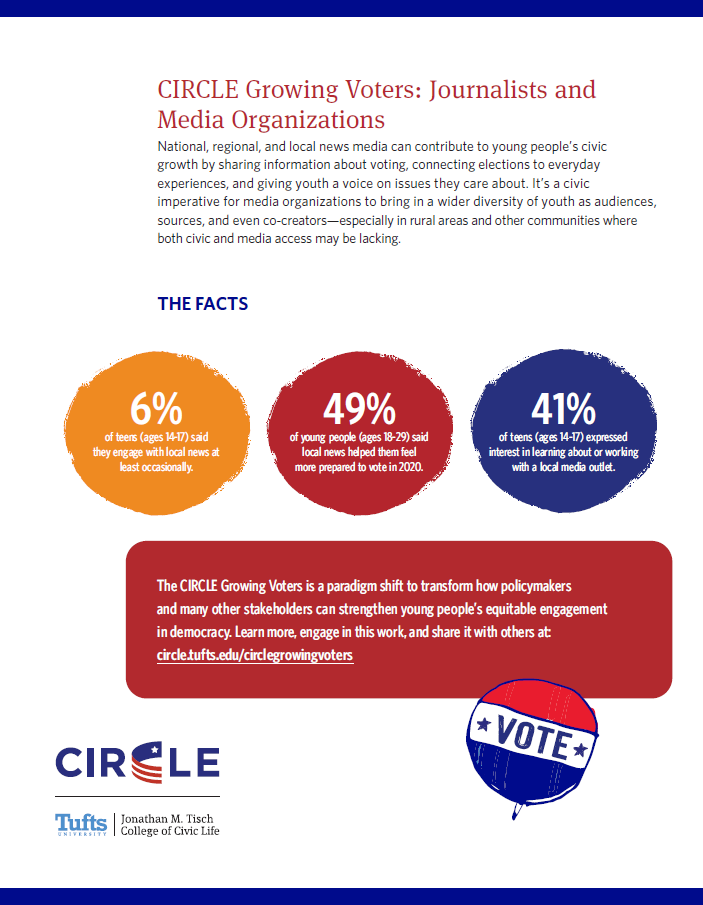
- Embrace local journalism’s civic responsibility
- Strive to better understand your youth audience—or lack thereof
- Create opportunities for youth journalism and input
- Use explanatory journalism
- Include youth voices in reporting on issues that affect them
Read the CIRCLE Growing Voters
Summary for Journalists and Media
Expert Insights on the Media and Young Voters
In July, we hosted an event titled Youth, News, and the Midterms: How the Media Can Grow Voters in 2022 and Beyond. A panel of media leaders and experts shared their thoughts on how journalists and media organizations can better engage youth as audiences and co-creators.
Public policy puts building blocks in place to make sure there’s equitable access to electoral learning and engagement. For example, if voting laws make it much easier for those who have voted before to participate in elections at the expense of those who haven’t, that may perpetuate or increase inequality. Legislation at the local, state, and federal levels can expand young people’s access to elections, especially newly eligible voters who need to register for the first time.
Our recommendations for policymakers include: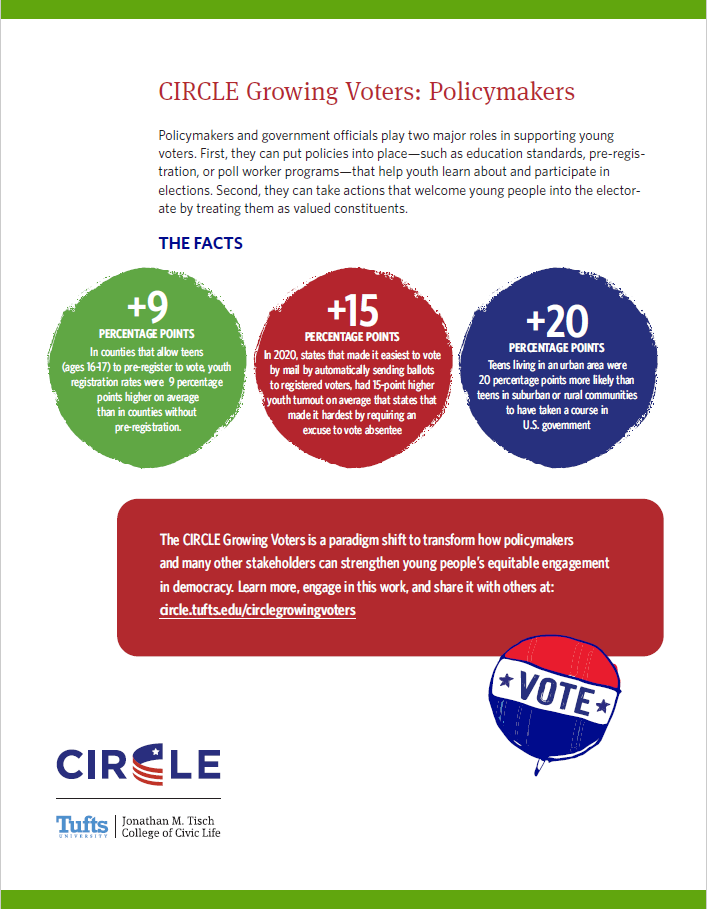
- Treat young people as your constituents
- Hire (and pay!) young people
- Enact and implement voter pre-registration
- Implement policies equitably and effectively
- Lower the voting age to 16 in local elections
Read the CIRCLE Growing Voters
Summary for Policymakers
The attitudes and habits of the people surrounding youth influence their likelihood to participate in civic life, both generally and when it comes to elections. Parental engagement in particular has a strong influence on how young people think about civic participation. There’s often a reinforcing cycle: young people whose parents have access to political engagement, time to be engaged, and are themselves involved in elections or other forms of political participation “pass on” that culture of engagement to their children.
Our recommendations for parents and families include: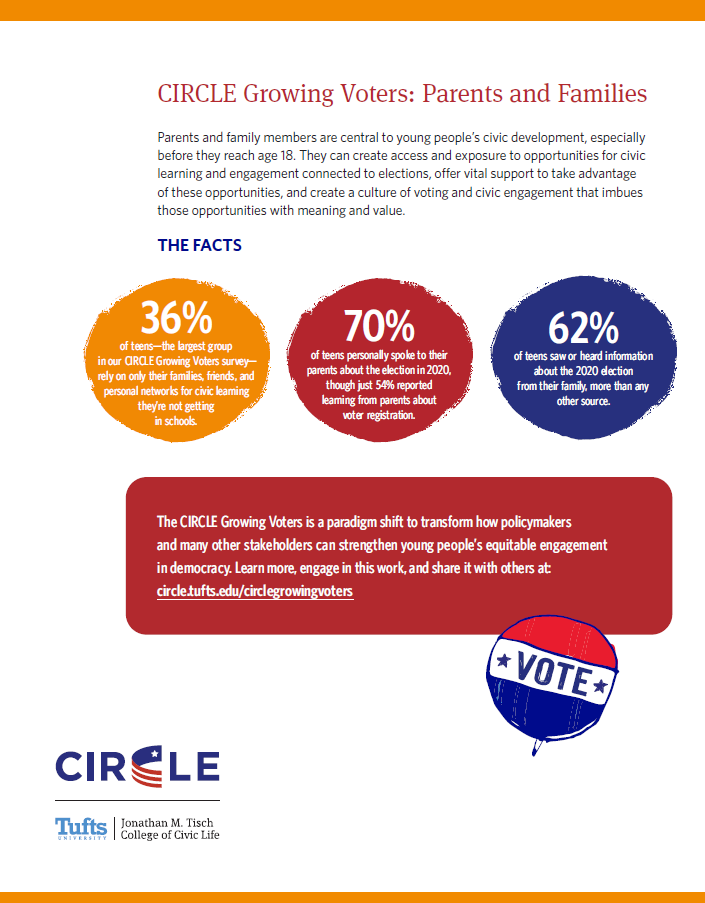
- Demonstrate voter engagement every chance you get
- Help your teens pre-register/register to vote
- Support teens in your family serving as poll workers
- Encourage political discussion and engagement
- Support civic education in schools
- Embrace the role of social media and help youth navigate it
Read the CIRCLE Growing Voters
Summary for Parents and Families
Young leaders can use their own networks to help institutions create systems of support for young voters. Young people have expertise in how to effectively reach, communicate with, and recruit other young people, and can harness this knowledge to show institutions their blind spots in outreach and contact, and can help institutions maximize their support for young voters.
Our recommendations for young leaders include: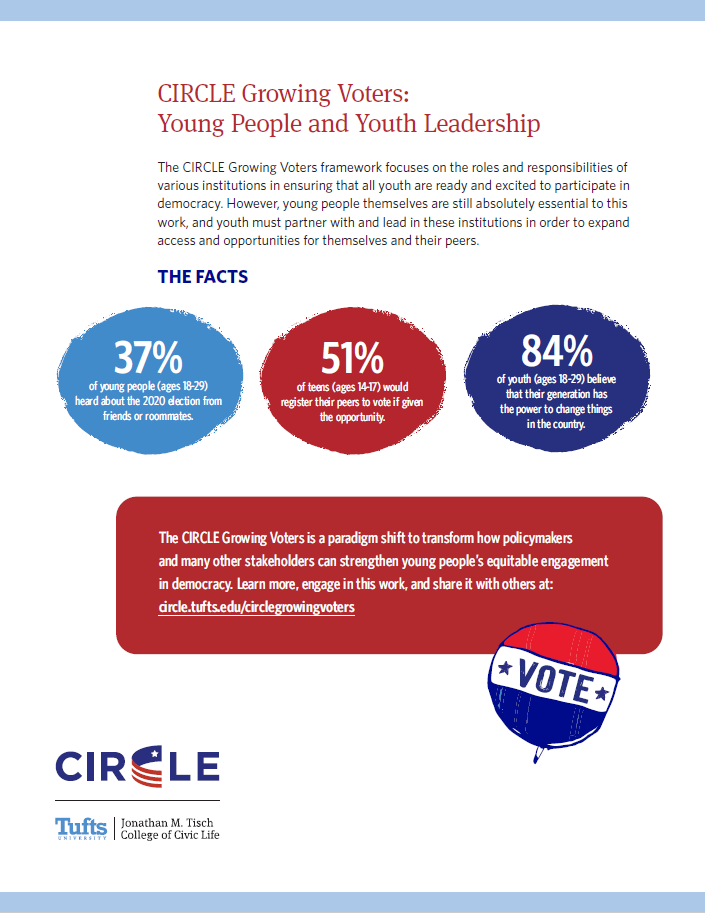
- Evaluate your community’s support of young voters
- Be a leader in community institutions
- Get involved with issues that matter to you
- Push your teachers and school to grow voters
- Host a voter registration drive at school or in your community
- Bring local politicians to your school or youth organization

